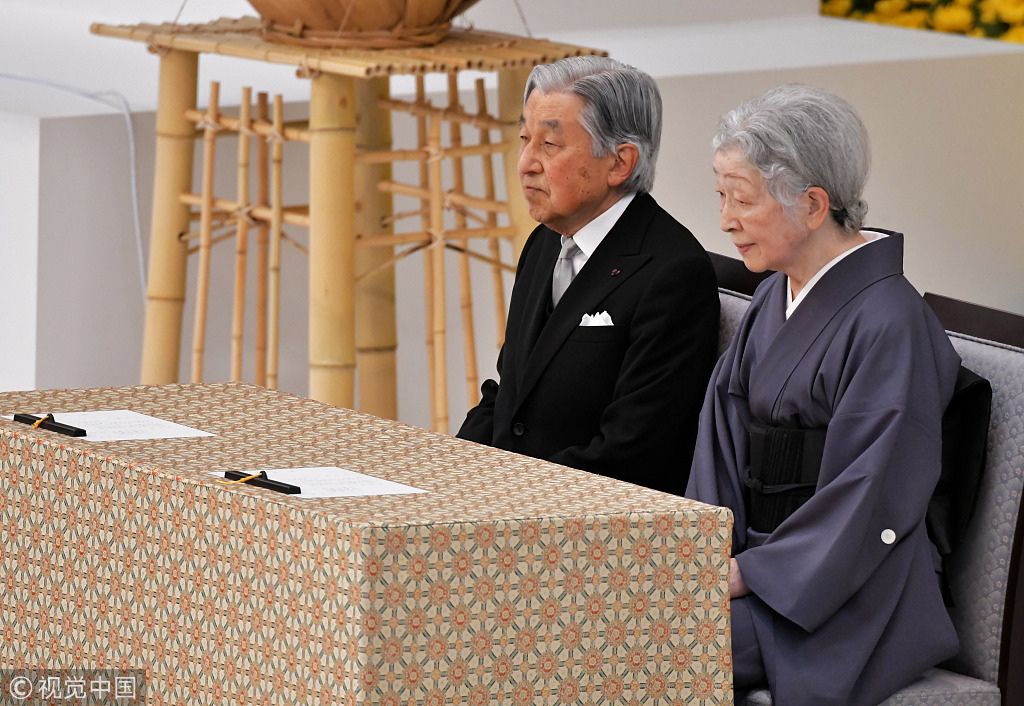Who'll be Japan's conscience-keeper after Akihito abdicates in April?


Living in anguish in his final years, late Japanese Emperor Hirohito was haunted by talks holding him responsible for Japan's war with China (and other countries) before and during World War II, as his close aide Shinobu Kobayashi wrote in his diary.
Kobayashi's diary entry, dated April 7, 1987, quotes Hirohito, 83, as saying a longer life would only "increase my chances of seeing or hearing things that are agonizing".
Another Hirohito chamberlain, Ryogo Urabe, wrote in his diary that the emperor wanted to convey his regret over the Sino-Japanese War to the visiting Chinese premier Hua Guofeng in May 1980. But senior officials of the Imperial Household Agency opposed Hirohito's idea for fear of a backlash from rightists in Japan.
Emperor Akihito, who ascended to the throne in 1989, is not in the shadow of his father. Although he has not apologized for the war, he has represented Japan's postwar pacifism. At a memorial service mourning Japan's war dead on Aug 15, the day Japan surrendered to the Allied forces in 1945, Emperor Akihito called for "reflecting on our past" and "bearing in mind the feelings of deep remorse" in his speech, adding that, "I earnestly hope that the ravages of war will never be repeated".
With the 84-year-old emperor set to abdicate in April 2019, Japan Times said memories of the last war that Japan fought and lost may be fading fast among a large majority of the Japanese people. More than 80 percent of Japan's population was born after the war. "Most Japanese now lack firsthand experience of the war," Japan Times said. "And with the passage of time, it will become increasingly difficult for us to keep the memories of the war alive and to pass them on to future generations."
Abe, who too spoke at the Aug 15 service, expressed "respect and gratitude" for the fallen souls. "We will not forget even for a moment that the peace and prosperity we enjoy today was built upon the precious sacrifices of the war dead," Abe said.
And instead of accepting Japan's war responsibility, he highlighted the achievements of postwar Japan. "Since the end of the war, Japan has consistently and assiduously walked the path of a country that values peace," he said, adding, "We will never again repeat the devastation of war. Humbly facing history, we will remain committed to this resolute pledge, no matter what the era may bring."
Mainichi Shimbun criticized Japan for its "national tendency of irresponsibility". The mindset, as the newspaper said, was once described by political scholar Masao Maruyama as "completely lacking the strong self-consciousness about causing such a large-scale war".
Conservatives are eager to leave Japan's war past behind. Closing a chapter of history, as Yomiuri Shimbun put it, is significant.
During his five years as Japanese prime minister, Junichiro Koizumi paid a visit every year to Yasukuni Shrine, which honors 14 Class-A war criminals along with many of Japan's war dead. In one statement, he said a more confident Japan, which he claimed to forge, will no longer allow outsiders to dictate Japan's history to it.
On the other hand, Akihito has repeatedly stressed the importance of studying history and passing it down to the next generations. He made amends for the war fought in his father's name by saying: "In the long history of relationship between our two countries, there was an unfortunate period in which my country inflicted great suffering on the people of China. About this I feel deep sadness." He made the statement at a banquet in the Great Hall of the People in Beijing during his visit to China in October 1992.
Trying to heal the traumas inflicted by wartime Japan, Akihito has acted as Japan's conscience-keeper, especially of its war past.
With less than one year left before Akihito abdicates, it's time to ask who will be Japan's new conscience-keeper.
The author is China Daily Tokyo bureau chief.


































